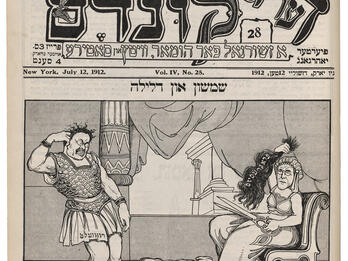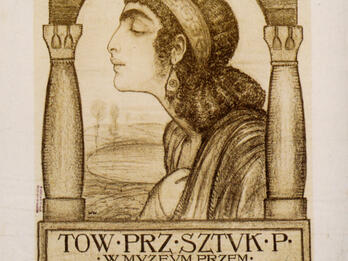Who Is Vildman the Wrestler?
Among the wrestlers competing in the current tournament in the Panorama [Building] on Karowa Street, fighting for the 1912 Polish Championship, is a Jew called Vildman.
He has become quite famous, in fact, a sensation; everybody’s talking about him. He is the greatest attraction in the whole tournament because he is not one of those Jewish strongmen who are just trying to prove their powers. No, he is a Jew who can demonstrate his strength, and this has garnered plenty of attention, both among Jews and Christians: Every time Vildman fights, people fill up the great hall of the Panorama.
The audience’s enthusiasm when witnessing Vildman’s victories over non-Jewish athletes of different nationalities and countries thus far is indescribable. Can we believe that he will win the first prize? It doesn’t seem likely that Vildman would be capable of defeating all the brawny, well-trained strongmen with whom he still has to fight. The good and pious people of Warsaw will probably not allow this wrestler, who is advertised as the “Jewish champion” fighter, to win. But that’s not the point. It is enough that a Jew is competing in the ring, not to mention that he is a Jew whose strength must be taken into account, whose hands and chest have a real effect.
And since the Jewish audience takes great pleasure in Vildman—they support him through thick and thin—this bothers the other side even more. The general attitude and frequent whistling of the frenzied people express their sharp reproach: how does such a zhidek1 have the impertinence to throw the opponent over his head and push him down to the floor onto his shoulders so that he can’t move at all? [ . . . ]
I find it interesting now to visit and meet Vildman in person, the man who, after late summer,2 became a bit of a sensation. A man with an athletic and artistic career, Vildman, just like other wandering circus and cabaret artists, has lived in hotels, often two to a room. [ . . . ]
His name is Avrom Vildman, and he is 28 years old. He was born to very pious parents in Subotica, a small town in Hungary. His father, a horse-dealer, kept him in heder until he was 15 years old.
I don’t know if all wrestlers are quiet types, but in Vildman’s case you have to pull the words out of his mouth. He speaks in a leisurely fashion, just like the way he wrestles.
“I also studied Talmud, and my parents wanted to make a teacher out of me. But what can poor parents accomplish? I forgot everything. I can still read and understand a bit of Yiddish,” he explained to me in a regretful tone in a mixture of German and Yiddish. [ . . . ]
“Are your parents as healthy as you are?” I asked him.
“My father is already seventy years old,” he said, “and he is strong enough. My mother is in her sixties and she is much stronger. I have two brothers and they are strong, too, but not like me. I also have eight sisters, and I am weaker than all of them. One of my sisters is a head taller than me,” he assured me.
“Can you make a living with your profession?”
“Yeah, I earn quite a good living, but my parents are poor. I have to send them lots of money.”
“And how do your colleagues relate to you, a Jew? Do you ever suffer on account of being a Jew?”
“Never. Our relationship is very collegial, but in the evenings when we wrestle, we can’t recognize one another. The next day we don’t remember who beat up whom, and we are once again very friendly to each other.”
“Are there many Jewish athletes and wrestlers?”
“In this part of the world there are very few. There is someone from Warsaw called Nussbaum who is a pretty good wrestler. There are more Jewish athletes in America.” [ . . . ]
As we can see, Mr. Vildman is not a great scholar, neither the offspring of a great rabbi nor a medical doctor, and yet thousands of people have taken an interest in him. He awakens a national spark in people’s hearts. And how does he do that? With pure physical strength!
The following true story well demonstrates the general interest in Vildman: A few days ago I ran into an acquaintance late at night who asked me this:
“What’s new? Who pinned whom?”
I scared him by saying that the Black Mask pinned Vildman. My intelligent acquaintance suddenly grabbed his head and screamed “Oy-vey,” just as if he had been told that one of his family members was killed.
“You fool,” I calmed him down, “he was not pinned, but it could happen one day. It’s better to get used to the idea gradually.”
A well-known civilized Christian ran into me in the street and made the following sarcastic remark, “What else do you want, you already have a Jewish deputy in the Duma, and a Jewish wrestler in Warsaw.”
Jewish power—as our enemies have claimed. There is one Vildman among so many non-Jewish athletes, and even for this they envy us!
The Blue Mask.
Notes
[A pejorative Polish term for a Jew, literally, “little Jew.”—Eds.]
[Lit., “cucumber season.”—Eds.]
Credits
Menachem Kipnis (Di bloye maske), “Ver iz der atlet Vildman?” [Who Is Vildman the Wrestler], Haynt, no. 200 (Sept. 9, 1912): p. 5.
Published in: The Posen Library of Jewish Culture and Civilization, vol. 7.




